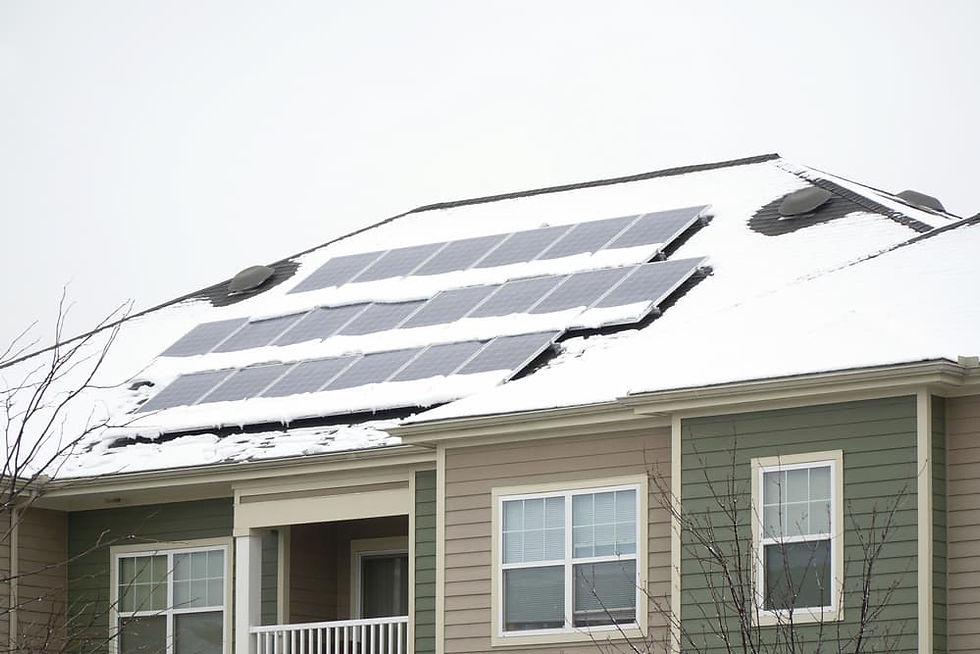Do Solar Panels Work in Cold Winter Weather?
- Spencer Benisch

- Dec 7, 2022
- 4 min read
Updated: Jul 24, 2023
One of the most commonly asked questions about solar is, "do solar panels work in the cold?" The short answer is yes, even in blustery New England. Technically, solar panels can generate power all year after installation, including in the winter, demystifying the common belief that solar panels only work in hot climates.
Solar power is the ideal solution for generating energy during winter storm power outages in Massachusetts. In this article, Devlin Energy helps you look at the effectiveness of solar panels in the cold season. Let's dive in!

Do Solar Panels Work In The North Eastern Cold?
Like most people living in severely cold areas, you may be looking for a solution for how to prepare for power outages caused by winter storms. Luckily, solar power is one of the most powerful and readily available energy sources globally that you can also use during winter. Contrary to what most people believe, the panels create energy from the sun's light, not heat.
Solar panels generate energy when sunlight photon particles activate the silicon electrons in the cells placed on the upward-facing surface of the panels. The reaction causes the electrons to move, generating electric currents that power your home.
In winter, the sun shines, hitting the solar panels and producing electricity even in the cold. Research shows that cold weather enhances the efficiency and longevity of solar pales. The solar panels will perform optimally since the cold weather eliminates the risk of overheating.
Do Solar Panels Work Covered in Snow?
You may be wondering what happens when solar panels are covered in snow. Solar panel manufacturers and installers build them to get rid of snow themselves. First, the solar arrays are usually mounted on the roof at an optimal angle facing the sun.
You Don't Need to Worry About Less Energy Generation During the Winter
The steep angle and the extremely smooth surface of solar panels will lead to snow sliding off fast. Additionally, the dark silicone cells in the solar absorb heat faster.
Panels are Built to Rid Themselves of Snow
Even a small part of the solar panel exposed to the sun can quickly generate heat enough to melt snow off such as the winter in the North East. It will leave the solar panel clear of snow and absorb as much light as possible to offer the power you need in your home. On extreme snow days, you can charge your batteries during the day or stay connected to the grid to avoid a power loss.

Advantages of Solar Panels During Winter
Some of the top benefits of using solar panels for energy production in your home during the New England winter include:
Solar panels rely on ever-available sunlight to generate electricity.
Cold weather increases the efficiency of solar panels, increasing the energy produced during the day depending on the amount of sunlight.
The installation angles and smooth surface of solar panels will ensure snow slides off without physical intervention.
Sunlight can pass through the snow and into the solar panels for power generation.
Solar panels are the most favorable energy option for states located in northern regions.
Solar will constantly produce power as long as sunlight enables you to store power in batteries during winter storm power outages.
Is the Energy Output of Solar Panels Worth It in the Winter?
The cold weather doesn't negatively impact solar panels' performance, but other factors, like snowfall, can influence the level of energy production. Ultimately, the total impact comes down to the amount of snow accumulating on the solar panel. UV rays can still penetrate through the light daunting of snow, and the snow will clear fast.
The amount of daylight during winter tends to be shorter than during summer. Although this does not affect the efficiency of solar panels, the hours of sunlight available during the day will determine the amount of output you get. Similarly, solar panels operate at reduced efficiency on cloudy days when no direct sunlight hits the surface. The crucial thing to remember is that solar is a great choice, regardless of the time of year, as the surface will remain exposed throughout the year.
Solar is a Great Choice, No Matter the Time of Year - Contact Devlin Energy
Summer offers the most sunlight, but winter is the best for solar energy production. The cold and sunny weather are efficient as long as no snow covers the top. Like other electronics, solar panels function better in cold than hot conditions. It means the solar panels will generate the most power in every precious hour of sunlight in winter.
Equally important, snow provides the best cleaning service as it melts and slides off the surface of the panels. During the dry months, dust and dirt can accumulate on the surface of the panels. The buildup will reduce solar efficiency hence reducing its performance. The snow in winter will wash off the dust leaving your panels clean and highly efficient all year long.
At Devlin Energy, we offer a seamless transition to clean and reliable energy in New England. Our mission is to ensure that all homeowners can access reliable and clean power in all seasons. Get a free quote today to find out how we can help.
Image Source
anatoliy_gleb/Shutterstock ND700/Shutterstock



Comments